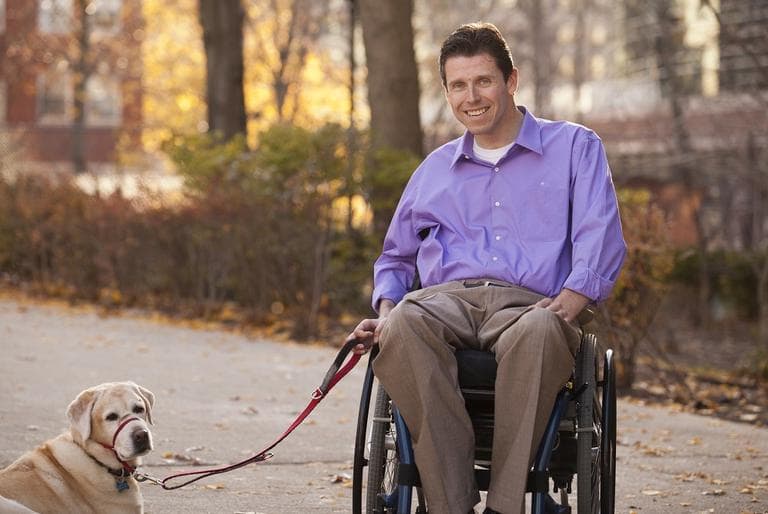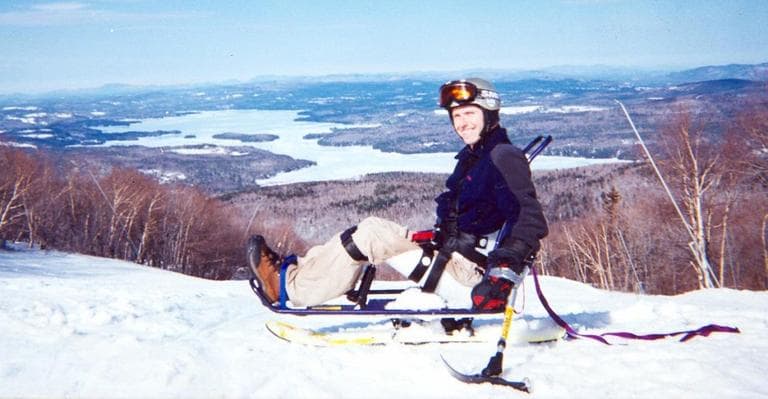Advertisement
From Spring Break To Quadriplegia, And Building A New Life

On March 19, 1991, Larry Brennan broke his neck.
He was 18 years old and suddenly paralyzed. He's had to use a wheelchair ever since.
At the time of the accident, Larry was a freshman at the University of Massachusetts Amherst; he was in the Bahamas with friends on spring break. The details of the accident are fuzzy, he says, because he was intoxicated at the time, having been on a “booze cruise” all day. He remembers running down the beach, then nothing else. According to his friends, Larry dove into the water. The impact broke his cervical spine.
Initially, when his friends saw him lying face down in the water, they assumed he was snorkeling, and it was several minutes before they realized he was in trouble. He wasn’t breathing when they pulled him out. One of his friends knew CPR, and working with the others, tried to resuscitate him until the ambulance came. Larry coughed up sea water and started to breathe again, but his heart stopped and restarted numerous times before help arrived.
Larry was raised in Wakefield, Massachusetts. In high school, he was a popular, 6-foot-4-inch athlete. He played football and tennis, became an accomplished skier and had many friends. As a freshman at UMass, he was flourishing, and his spring break trip was a highlight.
The accident damaged his spinal cord at the C 5-6 level, basically his lower neck, leaving him a quadriplegic (meaning he has weakness in all four limbs). He can move his shoulders and his upper arms, but not his fingers, and he's completely paralyzed from the upper chest down, with total weakness in his core trunk muscles and legs. However, Larry’s injury is considered “incomplete” in that his sensory nerve fibers were spared and his sensation is intact. For this, he feels lucky.
Here, Larry talks about coming to terms with his injury and learning to live a productive, happy life — though one he says he wouldn't wish upon anyone else. He finished college at UMass Boston six years after his injury. Now, he lives alone with his service dog Emmie, and gets help from a home aide. He works full time as a Senior Development Officer at Massachusetts General Hospital; goes on dates, skis and sails, and still hangs out with his high school buddies. As Larry puts it, “the biggest thing for me is that I live a full and active life — similar to how my life would have been had I not been injured. Now, I can’t walk, but this is not so important to me anymore. I care most about my relationships with friends and family, staying active and having fun.”

In meeting Larry, I realized how little I understood about quadriplegia before our interaction. I never really stopped to consider the day-to-day challenges that someone in this situation faces, and the tremendous strength that it takes to overcome these obstacles. Moreover, meeting Larry has made me think about how our fears of the unknown can hinder true and genuine connection in life. When I first met Larry, I was nervous, checking myself, wondering how to be. Should I try to shake his hand or will this make him uncomfortable? Should I offer him food and drink during our meeting or will that be too hard? And so on. Larry has taught me that it is better to just ask, to be direct, and not to let these mundane, functional issues get in the way. Larry has no hang ups about these things, so why should I? We just do some things differently, and that’s all.
(Dr. Annie Brewster is a Boston internist who became interested in storytelling as a way to promote healing among patients. You can hear more of her stories here, here and here, as part of our Listening To Patients series.)
